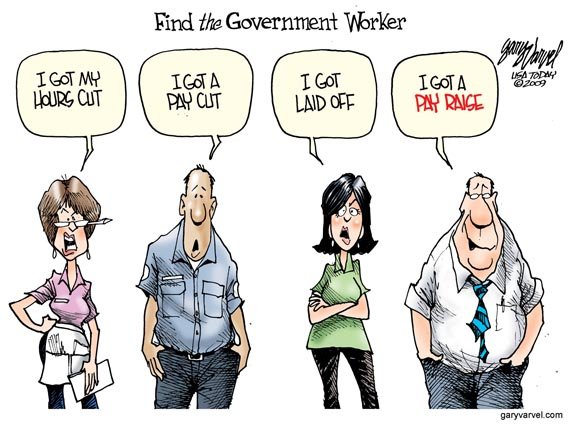Towards Voluntaryism (Part 22)
3.5. Government: Salary & Wage Revision for Public Servants
Towards Voluntaryism (Part 22)
Article 4: Revision of salary and wage structure for elected and appointed public servants.
The following proposed legislation is intended to revise the salary, wages and benefits of elected and appointed public servants to reflect the well-being of their constituencies and the communities they serve. The ability of public servants to determine their own salaries and the salaries of other public servants must be eliminated entirely. Public servant salaries shall be set as a multiple of their constituencies average post-tax income. Public servants should also be exempted from the income tax, as their salaries are drawn from tax dollars, eliminating double-taxation and needless bureaucracy. Public servants that seek to repeal or modify this legislation must, if unsuccessful in the popular vote mandated to do so, abdicate their role as a public servant immediately and permanently.
The goal of Article 4 is to make public servants salaries a reflection of how well they serve their constituencies and jurisdiction. Public servants must be encouraged to reduce the tax burden on their constituencies by pegging their salary to the average post-tax take-home pay. A knock-on effect will hopefully be a reduction in the size of government. Under the current paradigm, public servants experience few consequences from higher taxation than private citizens, that must change. They may serve needed functions (debatable), but there is no reason for them to earn more than the people they are meant to serve.
To that end, I suggest:
Article 4: Revision of salary and wage structure for elected and appointed public servants.
§4.1. The salary of elected and appointed public servants shall be established as a multiple of the municipal, county, state or national average net income (i.e. post-tax income) appropriate to the public office and constituency in question. This salary, adjusted for inflation, will be recalculated annually so that the pay of a public servant will reflect the financial well-being, understood as post-tax income, of their jurisdiction and its constituents.
§4.2. Each jurisdiction/constituency shall hold a general public vote to determine which multiplier shall be applied within its jurisdiction. The salary of an elected public servant shall be voted to be a multiple of the average jurisdictional post-tax take-home income not to exceed twice that is 200 percent (x2.0) and not below half that is fifty percent (x0.5) of the jurisdictional average. (Example: If the local average income in a small city is $65,000 with an overall tax rate of 30%, the take-home income is ca. $50,000 after taxes; the salary of an elected public official (e.g. the mayor) shall then be voted on in a public vote to be between $25,000 (50%) and $100,000 (200%).)
§4.3. The salary of an appointed public servant shall never exceed the post-tax take-home income of the average local private sector equivalent (i.e. an appointed accountant working for a jurisdictional governing body shall never be entitled to earn more than the average take-home income of an accountant working in the private economy). The term 'local' in this context refers explicitly to the municipality in which the public servant's office is located. In the event a public servant's position has no private sector equivalent, it too shall be voted on as per §4.2.
§4.4. Public servants, both appointed and elected, shall no longer be required to pay state or federal income taxes. As public servant salaries are paid for by tax dollars and their wage is set at the average post-tax take-home income of their jurisdiction, they shall be considered exempt. Public servants shall, however, continue to be required to file annual returns until such time as their constituency is not.
§4.5. Public servant pension funds shall be adjusted to reflect the well-being of their communities. Public pension funds shall be capped, per public servant, at the average of their local constituency's pension. Further, public servant health insurance is to be adjusted to reflect the average health insurance of their constituency. This requires that an annual survey be initiated in each jurisdiction to determine pension rates and health insurance conditions.
§4.6. All current public servant employment contracts, both elected and appointed, are immediately to be amended to reflect the new salary, wage and benefit structure as voted into effect by the relevant constituency.
§4.7. Any attempt by elected or appointed servants to change the salary multiplier and compensation derived from public funds shall be subject to a general vote of the relevant constituency. Under no circumstances can the limits set in §4.1-3 be raised by public servants acting on their own behalf or without a general vote of the public. Under no circumstances shall public servants be entitled to determine their own salary or the salary of other public servants, though they can affect it as a consequence of reducing or raising taxation on their constituencies as detailed in §4.1 and §4.2.
§4.8. Non-public servants of any jurisdiction are entitled to call for a new vote for salary and wage structure, as described in §4.2, in keeping with relevant guidelines to reflect their satisfaction or lack thereof with elected representatives.
§4.9. No legislation or regulation shall be permitted that abolishes, modifies, addends or changes any part of §4 that is not subject to a popular public vote by the jurisdictional constituency. Any elected or appointed servant who seeks to tender legislation or regulation that modifies, addends or changes §4 that goes to the public vote shall, in the event that the attempt to abolish, modify, addend or change is unsuccessful, be immediately discharged from public office and be forbidden from holding public office until the end of their days. Furthermore, said abolition, modification, addenda or change shall not be eligible for renewed consideration for a period of no less than 10 years.
§4.10. All salaries, wages and benefits of public servants must be made available online for inspection by the public without access restrictions of any kind.
This is very much a working proposal and I welcome feedback. I am trying to find the correction formulation for the proposed legislation so that it can ultimately be introduced as a ballot measure. The following sections will address how to enact and enforce the legislation proposed thusfar.
Next: [Towards Voluntaryism (Part 23) - Enactment and Enforcement]
...

.
.
.
Shot with a golden arrow,

Cupid Zero
.
I consider requests to write on a topic of your choice.
.
Don't forget to upvote, follow and resteem! Comments always appreciated.
.
.
.
.
.
.
.
.
.
.
.
.
.
If you aren't on Steemit, please consider supporting my work with a gift of:
Bitcoin: 1fruAGn9JcKqJJscreUpS2XurfLzksBe8
Litecoin: LQf19ExcdSFDjYj6NktRgzBnJ7NScVgikA
Ethereum: 0xEe3005b1D2D8963a85E1Ca4ff511acCd98A1E29D




There has to be a special attention on benefits. Like funds used for "travel assignments" or other things related to extra funds that could be given to public servants. Normally the main sources of peculation come from this type of benefits.
I agree. Not very familiar with the ins-and-outs of the benefits of such offices so was uncertain as to how to formulate a transparency and restriction clause that would be adequate. I will have to look into that some more. Perhaps some kind of open ledger provision for expenditures that are not salary related subject to revision by civilian oversight. I will have to think about that.